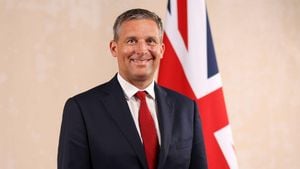The conflict between Ukraine and Russia has continued to escalate, with significant military developments occurring on multiple fronts. On December 2, the United States announced another substantial military aid package for Ukraine, valued at $725 million. This initiative is part of the Biden administration's effort to bolster Ukraine's defenses against the persistent Russian aggression. Secretary of State Antony Blinken emphasized the need for such assistance, reinforcing the US government's commitment to Ukraine's sovereignty during this fraught time.
The latest aid package, marking the 71st such delivery since August 2021, includes advanced weaponry aimed at enhancing Ukraine's air defense systems and overall military capabilities. Some notable items include missiles compatible with the NASAMS air-defense system, Stinger missiles, Counter-Unmanned Aerial Systems (c-UAS) munitions, and various artillery shells. These resources are intended to help Ukraine counter the increasing use of drones and missile strikes on its infrastructure by Russian forces.
The provision of military assistance has not been without controversy. Human rights organizations have raised concerns over the inclusion of non-persistent land mines, arguing their use poses significant long-term risks to civilians, regardless of their type or nature. Critics see this as part of the larger debate on military support strategies and the humanitarian consequences of such measures.
Meanwhile, the United Nations issued warnings concerning the suggestion of deploying Western troops to Ukraine. On December 2, Stephane Dujarric, spokesperson for UN Secretary-General António Guterres, stressed the need to prevent any actions which might escalate the conflict. His comments came amid discussions among European leaders about the potential for increased military involvement, underscoring the delicate balance of support for Ukraine without risking broader warfare.
Concerns about troop deployments surfaced particularly after European Union foreign policy chief Kaja Kallas, during her visit to Kiev, refrained from ruling out the possibility of sending EU forces to Ukraine. She described the security situation as one of utmost seriousness, emphasizing the need to maintain strategic ambiguity on military options. This aligns with recent frustrations among some EU members about the prolonged nature of the conflict and the invisible borders of their support for Ukraine.
The looming threat of intensified hostilities was echoed by Ukrainian defense officials as they reported significant advances by Russian forces. Reports indicate Russian troops are advancing toward Kurakhove, highlighting the deteriorated situation around key cities in the Donetsk region. Stanislav Bunyatov, a platoon commander from Ukraine's 24th Separate Assault Battalion, stated clearly, “...unfortunately, the full occupation of Kurakhove is a matter of time.” The tough conditions faced by Ukrainian fighters were laid bare during these confrontations, as they strive to hold back Russian advances.
Despite the challenges, the Ukrainian Armed Forces continue to work diligently on the front lines. Supreme Commander-in-Chief Volodymyr Zelenskyy discussed recent military operations with commanders, emphasizing the importance of maintaining morale and combat readiness. He noted successes achieved by Ukrainian forces in the Zaporizhzhia direction, where defensive measures have reportedly had positive outcomes.
While Ukraine is bolstered by Western military aid, the political ramifications within the US continue to evolve. The recent military aid package was announced against the backdrop of significant travels and discussions among US lawmakers. Discussions about foreign policy strategies have become more contentious, as the Biden administration seeks to navigate the complex realities of the Russia-Ukraine war.
The sharp criticisms from various quarters prompt questions about the long-term nature of US involvement and its ramifications on political and financial priorities at home. Critics argue the extensive financing could complicate domestic agendas surrounding healthcare, inflation, and infrastructure.
Russia, for its part, remains adamant about its position, viewing the military support provided to Ukraine as mere prolongation of conflict rather than a solution. Kremlin representatives explained how they perceive these provisions as evidence of direct Western involvement, framing the narrative as part of greater geopolitical tensions.
This rhetorical skirmish points to the precarious nature of international relations as the war continues. The potential for escalation—whether through military means or through political maneuvering—remains high. The UN has emphasized the importance of cross-communication and diplomacy as avenues to avoid war's broader entanglements.
While discussions about troop deployments intensify, the international community finds itself at another crossroads, weighing the risks against potential outcomes. By maintaining pressure on both sides for negotiation, the hope is to weather the storm without exacerbation. The complex dynamics of the Ukraine conflict will not resolve easily, but the focus remains on protecting civilians and finding pathways to peace.
The human toll of this conflict has been staggering. With millions displaced and substantial destruction across the nation, communities are facing immense pressure. Local authorities, emergency services, and citizens continue to work together to manage the aftermath of recent strikes, including those reported on December 3, where multiple properties were damaged but fortunately with no reported casualties.
While the military dimension of the conflict appears to be intensifying, it is equally imperative to focus on the humanitarian impacts of the war. Continuous support for Ukraine aligns with larger strategic interests, but watching for its effects on ordinary lives remains of utmost importance. Reluctance to escalate the conflict must be matched by actions to support peace and stability, ensuring the path to resolution does not become overshadowed by gunfire and rhetoric.



